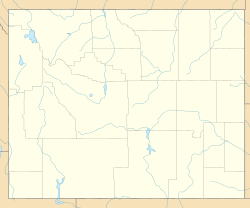Cooper Lake is a railroad station and former settlement in Albany County, Wyoming, United States.
Cooper Lake, Wyoming | |
|---|---|
| Coordinates: 41°37′58″N 105°46′08″W / 41.63278°N 105.76889°W | |
| Country | United States |
| State | Wyoming |
| County | Albany |
| Time zone | UTC-7 (Mountain (MST)) |
| • Summer (DST) | UTC-6 (MDT) |
| ZIP codes | 82058 |
| GNIS feature ID | 1586964[1] |

It is named for the lake located to west of the community[2][3] and was created as a station on the Union Pacific Railroad and First transcontinental railroad in the late 1860s.[4]
During an 1867 surveying expedition, several Euro-American men died in a skirmish with Native Americans near where the Cooper Lake station became located.[5] The Cooper Lake station was about 15 miles west of the Wyoming station, at an elevation of 7,044 feet. During the construction of the railroad, a large number of railroad ties were delivered to this location.[4] The line from Omaha, Nebraska reached Cooper Lake by July 1, 1868.[6] A small store was opened at the Cooper Lake station to supply provisions to freighters and tie cutters. The store was robbed in 1869, and the guilty parties were captured.[3]
An 1869 railroad guide describes the station as follows: "The station, with a grocery in it, it owned by the occupant. Aside from this there is one saloon to fill this bill. The company receives a great many ties at this station. There is a Telegraph Office here. Elk Mountain can be seen off to the south from here."[7]
The 1916 edition of The Complete Official Road Guide of the Lincoln Highway describes Cooper Lake as "nothing but a section house; no accommodation for tourists. Drinking water, radiator water and camp site."[8]
Geography
editThe area around Cooper Lake features beds of sandstone and claystone dating to the Tertiary period, intercalated with beds of sand and conglomerate.[9] The lake bed had dried up by 1956.[10]
References
edit- ^ "Cooper Lake, Wyoming". Geographic Names Information System. United States Geological Survey, United States Department of the Interior.
- ^ Bowman, J. R. (1882). Shearer, Frederick E. (ed.). The Pacific tourist. J.R. Bowman's illustrated transcontinental guide of travel from the Atlantic to the Pacific Ocean. New York: J.R. Bowman. p. 89. OCLC 752667534. Retrieved May 16, 2018.
- ^ a b Mickelson, Nancy Trabing (20 March 2020). A Territorial Empire: The Trabings and their Freight, WyoHistory.org ("At Medicine Bow and Cooper Lake Station, they opened small stores, supplying whatever their freighters and tie cutters needed. Outlaws robbed them at Cooper Lake Station in 1869, and were soon captured and jailed by Albany County Sheriff Nathan K. Boswell.")
- ^ a b Crofut's Trans-Continental Tourist's Guide, p. 70 (1871)
- ^ Trottman, Nelson Smith. History of the Union Pacific: A Financial and Economic Survey, p. 59 (1923)
- ^ Joseph Barker and the 1868 Union Pacific Raiload Excursion from Omaha, p. 145
- ^ Brown, C. Exera Brown's Gazetteer of the Chicago and Northwestern Railway, and Branches, and of the Union Pacific Rail Road, p. 21 (1869)
- ^ The Complete Official Road Guide of the Lincoln Highway, p. 120 (1916)
- ^ Darton, Nelson Horatio; Siebenthal, Claude Ellsworth (1909). Geology and Mineral Resources of the Laramie Basin, Wyoming. U.S. Government Printing Office.
- ^ Wyoming Fish and Game Commission (1956). Wyoming Wild Life. Vol. 20. p. 8.

